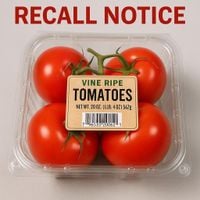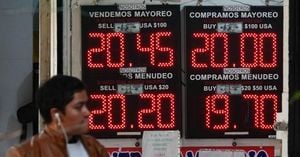Before slicing those tomatoes for your next meal, consumers in 14 U.S. states are being urged to check their produce purchases as a significant tomato recall has been initiated due to potential salmonella contamination. On May 7, 2025, the U.S. Food and Drug Administration (FDA) confirmed that tomatoes distributed by Ray & Mascari and Williams Farms Repack are at the center of this recall. Although no illnesses have been reported yet, the FDA’s warning highlights the importance of consumer vigilance.
Ray & Mascari, Inc., based in Indiana, has voluntarily recalled its "Vine Ripe Tomatoes" sold in plastic clamshell containers. These tomatoes, specifically the 4 Count Vine Ripe Tomatoes packaged in 20-ounce, 4-pack clamshell containers, were distributed to Gordon Food Service stores across several states. The affected products have UPC code 7 96553 20062 1 and are marked with lot numbers RM250424 15250B or RM250427 15250B. The tomatoes were sourced from Hanshaw & Capling Farms in Immokalee, Florida, before being repacked in Indianapolis, Indiana.
The states impacted by the Ray & Mascari recall include: New York, Illinois, Michigan, Indiana, Kentucky, Missouri, Mississippi, Pennsylvania, Ohio, Tennessee, and Wisconsin. Consumers in these states are advised to discard any tomatoes that match the recall details to avoid potential health risks.
Similarly, Williams Farms Repack LLC has also issued a recall affecting tomatoes sold under the Williams Farms Repack and H&C Farms labels. This recall includes various packaging options: 3-count trays, 60-count cases, and 25-pound boxes labeled as 4×5 or 5×6 tomatoes. The 3-count trays carry a UPC code of 0 33383 65504 8 and were marked with use-by dates between April 23 and April 28, 2025. The states affected by the Williams Farms Repack recall are Georgia, North Carolina, and South Carolina.
As of now, the FDA has not linked any illnesses to the recalled products, but they emphasize the seriousness of salmonella contamination. The bacteria can cause severe gastrointestinal illness, particularly in vulnerable groups such as young children, elderly individuals, pregnant women, and people with weakened immune systems. Symptoms of salmonella infection typically include diarrhea, abdominal cramps, fever, nausea, and vomiting.
According to the CDC, salmonella is a leading cause of foodborne illness in the United States, resulting in thousands of hospitalizations each year. The recent recalls serve as a reminder of the ongoing need for food safety from farm to table.
For consumers who may have purchased the affected tomatoes, it is crucial to check the packaging for the brand, lot number, and purchase location. If any of these details match the recall information, it is advised not to consume the tomatoes. Instead, they should be discarded or returned to the point of purchase for a full refund.
Consumers seeking more information can contact Ray & Mascari Inc. at 317-637-0234, available Monday through Saturday from 6 a.m. to 5 p.m. ET. For inquiries regarding Williams Farms, customers can reach Jason Breland at 843-866-7707 or 843-599-5154, Monday through Friday between 8 a.m. and 5 p.m. ET.
This tomato recall is not an isolated incident. Recent weeks have seen several food recalls affecting Americans, including a voluntary recall from Upper Crust Bakery LP, which affected three of its bread products after glass fragments were discovered on the loaves. This recall impacted 89 cases of Ancient Grains Hoagie Rolls, 699 cases of Multigrain Sourdough, and 30 cases of Whole Grain Multigrain bread, all sold frozen and packaged in corrugated paper cartons across six states: California, Connecticut, Delaware, Maryland, Ohio, and Pennsylvania. Additionally, Duda Farm Fresh Foods, Inc. recalled its washed and ready-to-eat Marketside Celery Sticks due to possible contamination with Listeria monocytogenes.
As consumers navigate these recalls, the importance of food safety remains paramount. The proactive measures taken by Ray & Mascari and Williams Farms Repack to remove potentially contaminated products from distribution reflect a commitment to public health and safety. Staying informed and vigilant about food recalls is essential for protecting oneself and one’s family.






